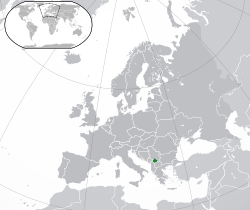This article is about the independent republic declared in 2008. For the state proclaimed in 1990, see Republic of Kosova. For the Kosovo region, see Kosovo. For other uses, see Kosovo (disambiguation).
| Republic of Kosovo | ||||||
|---|---|---|---|---|---|---|
| ||||||
| Anthem: Europe [1] | ||||||
|
Location and extent of Kosovo in Europe.
| ||||||
| Capital and largest city | Pristina 42°40′N 21°10′E | |||||
| Official languages | ||||||
| Recognised regional languages | ||||||
| Demonym |
| |||||
| Government | Parliamentary republic | |||||
| - | President | Atifete Jahjaga | ||||
| - | Chairman of the Assembly | Jakup Krasniqi | ||||
| - | Prime Minister | Hashim Thaçi | ||||
| Legislature | Assembly of Kosovo | |||||
| Area | ||||||
| - | Total | 10,908 km2 4,212 sq mi | ||||
| - | Water (%) | n/a | ||||
| Population | ||||||
| - | 2011 estimate | 1,733,842b | ||||
| - | 1991 census | 1,956,196c | ||||
| - | Density | 159/km2 412/sq mi | ||||
| GDP (PPP) | 2011 estimate | |||||
| - | Total | $12.859 billion[2] | ||||
| - | Per capita | $7,043 | ||||
| GDP (nominal) | 2011 estimate | |||||
| - | Total | $6.452 billion[2] | ||||
| - | Per capita | $3,534 | ||||
| Gini | 30.0[3] medium | |||||
| HDI (2012) | high | |||||
| Currency | Euro (€)d (EUR) | |||||
| Time zone | CET (UTC+1) | |||||
| - | Summer (DST) | CEST (UTC+2) | ||||
| Drives on the | right | |||||
| Calling code | +381e | |||||
| ISO 3166 code | XK | |||||
| a. | Only partially recognised internationally. | |||||
| b. | Preliminary results of 2011 census, which excluded four northern Serb-majority municipalities where it could not be carried out. | |||||
| c. | This census is a reconstruction, as it was mostly boycotted by the ethnic Albanian majority. | |||||
| d. | Adopted unilaterally; Kosovo is not a formal member of the eurozone. | |||||
| e. | +381 for fixed lines; Kosovo-licenced mobile-phone providers use +377 (Monaco) or +386 (Slovenia) instead. +383 from 2015. | |||||
| f. | XK is a "user assigned" ISO 3166 code not designated by the standard, but used by European Commission,Switzerland, the Deutsche Bundesbank and other organisations. | |||||
| Part of a series on the |
| History of Kosovo |
|---|
 |
| Early History |
| Middle Ages |
| Ottoman Kosovo |
| 20th century |
| Recent history |
| See also |
The Republic of Kosovo /ˈkɒsəvoʊ, -ˈkoʊ-/[5] (Albanian: Republika e Kosovës; Serbian: Република Косово / Republika Kosovo) is the governing authority over most of the region of Kosovoin the Balkan Peninsula of Southeastern Europe and is recognised as a sovereign state by 106 UN member states, though its status is disputed. Its largest city and capital is Pristina. Kosovo is landlocked and is bordered by the Republic of Macedonia to the south, Albania to the west and Montenegro to the northwest. The nature of the remaining line of demarcation is the subject of controversy — seen by proponents of Kosovan independence as the Kosovo-Serbia border and seen by opponents of the independence as the boundary between Central Serbiaand the claimed Serbian Autonomous Province of Kosovo and Metohija.[6] Kosovo institutions have control over most of the territory of Kosovo, while North Kosovo, the largest Serb-majority enclave, is largely outside their control and is run by local Serbian institutions with funds and support from Belgrade.
After a failure to produce results from non-violent resistance to Serbian rule from 1990,[7] and an armed insurgency by Albanians from 1997-1999, NATO launched a 78-day assault on FR Yugoslavia to halt the war in Kosovo. In 1999 the United Nations through UNMIK began overseeing the administration of the province after a UN Security Council (UNSC) resolution. On 17 February 2008 Kosovo's Parliament declared independence, as the "Republic of Kosovo", which has received recognition from some sovereign states. Serbia does not recognise the secession of Kosovo[8] and considers it to be legally a UN-governed province within its sovereign territory,[9] a position supported by a number of other countries.
The Republic of Kosovo has been recognised by 106 UN member states and is a member of the International Monetary Fund (IMF), World Bank, International Road and Transport Union (IRU), Regional Cooperation Council, Council of Europe Development Bank and the European Bank for Reconstruction and Development.[10] 23 of 28 countries of the European Union have recognised the Republic of Kosovo. In April 2013, following a resolution by the European Parliament which urged all EU members states which had not recognised Kosovo to do so, Romania's Prime Minister Victor Ponta stated that his country should follow the EU's lead..[11][12]




No comments:
Post a Comment